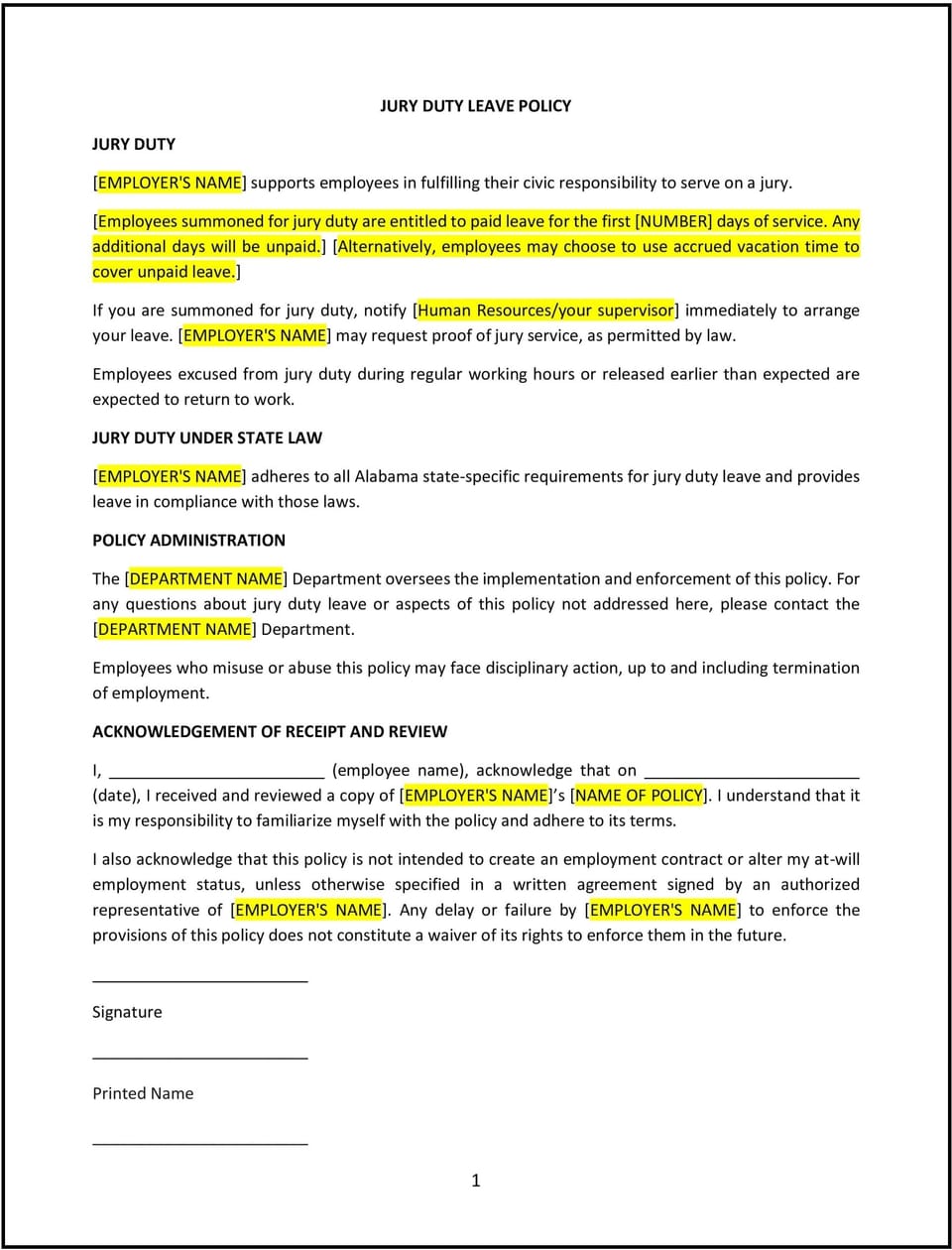Jury duty leave policy (Alabama): Free template

Jury duty leave policy (Alabama)
A jury duty leave policy provides employees with guidelines for taking time off to fulfill their civic responsibility of serving on a jury. For SMBs in Alabama, this policy ensures employees understand their rights and responsibilities when called for jury duty while minimizing disruptions to business operations.
By outlining procedures for requesting leave, documenting attendance, and addressing pay during the leave period, this policy promotes compliance with Alabama laws and supports employees in meeting their civic obligations.
How to use this jury duty leave policy (Alabama)
- Clarify eligibility: Specify that all employees summoned for jury duty are eligible for leave under this policy.
- Outline notification procedures: Require employees to notify their supervisor or HR as soon as they receive a jury summons, providing a copy of the notice.
- Address pay considerations: Clearly state whether the company offers paid jury duty leave or requires employees to use accrued time off, in accordance with Alabama regulations.
- Include documentation requirements: Request proof of jury service, such as attendance slips from the court, to verify the leave period.
- Reaffirm non-retaliation: Emphasize that employees will not face retaliation or adverse consequences for fulfilling their jury duty obligations.
Benefits of using a jury duty leave policy (Alabama)
A jury duty leave policy benefits both the business and its employees by providing clear guidance and supporting civic engagement. Here’s how it helps:
- Ensures compliance: Aligns with Alabama laws protecting employees called for jury duty.
- Reduces confusion: Provides clear instructions for employees and managers, minimizing misunderstandings about leave requirements.
- Supports employee morale: Demonstrates the company’s respect for civic responsibilities and legal obligations.
- Protects business continuity: Helps managers plan for temporary absences to maintain operations during jury service.
- Enhances public image: Reflects positively on the company’s commitment to supporting employees in their civic duties.
Tips for implementing a jury duty leave policy (Alabama)
- Communicate expectations: Regularly inform employees about their rights and responsibilities under the policy during onboarding and through the employee handbook.
- Plan for absences: Encourage managers to have contingency plans for coverage during jury duty leave.
- Support flexibility: Allow employees to work adjusted hours or remotely, where possible, to accommodate partial-day jury service.
- Address pay policies: Clearly outline whether the company provides paid leave for jury duty or requires employees to use vacation time, ensuring compliance with Alabama regulations.
- Maintain accurate records: Keep detailed records of jury duty notices and attendance confirmations for documentation and payroll purposes.
Q: Are employees entitled to take time off for jury duty in Alabama?
A: Yes, employees are entitled to take leave for jury duty, as Alabama law prohibits employers from discharging or penalizing employees for serving.
Q: Will employees be paid during jury duty leave?
A: This depends on company policy. Some employers offer paid jury duty leave, while others may require employees to use accrued PTO or unpaid leave.
Q: What proof of jury duty is required?
A: Employees should provide a copy of their jury summons and any court-issued documentation confirming their attendance.
Q: How should employees notify the company of their jury duty?
A: Employees should inform their supervisor or HR as soon as they receive a jury summons and provide the necessary documentation.
Q: Can employees work part-time while on jury duty?
A: If court schedules allow, employees may coordinate with their supervisor to work outside of jury service hours.
Q: Are employees protected from retaliation for serving on a jury?
A: Yes, Alabama law prohibits employers from retaliating against employees for fulfilling their jury duty obligations.
This article contains general legal information and does not contain legal advice. Cobrief is not a law firm or a substitute for an attorney or law firm. The law is complex and changes often. For legal advice, please ask a lawyer.


